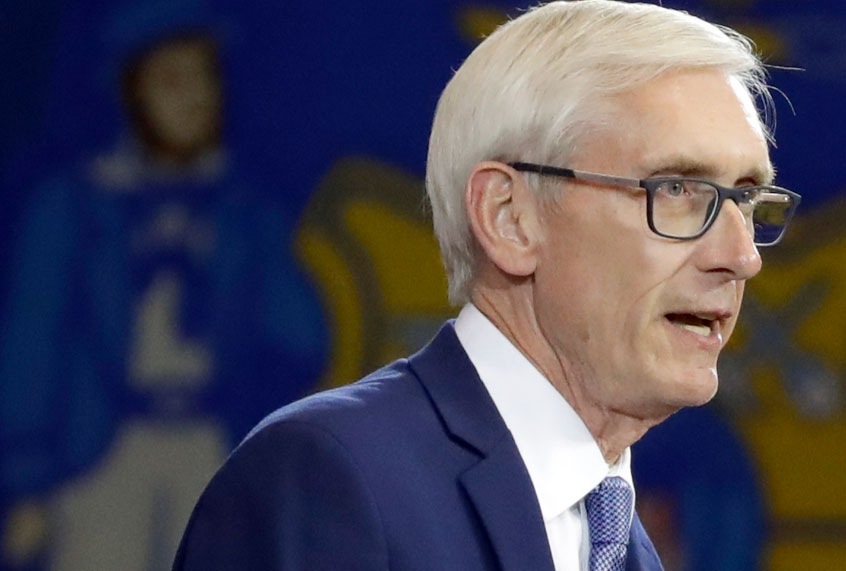Wisconsin is holding its primary as scheduled Tuesday after the state Supreme Court blocked Gov. Tony Evers from postponing the election due to the coronavirus pandemic.
Evers, a Democrat, initially resisted cries to postpone the election before calling a special legislative session Saturday to press the Republican-led legislature to take up a bill that would cancel in-person voting and move to an extended all-mail election. After Republicans refused to take up the issue and adjourned within seconds, Evers issued a last-minute executive order on Monday postponing the election until June.
The state Supreme Court blocked the move Monday night, ruling that he did not have the authority to do so. Evers himself said he did not have the authority before issuing the order. Under state law, only the legislature can move the election.
“This is it. There is not a plan B. There is not a plan C,” Evers said after the decision.
Local officials were furious that the decision would force voters to either turnout amid a pandemic or be left voiceless.
“Unbelievable. Wisconsin’s hyper-partisan Supreme Court is barreling ahead with a reckless election that is certain to disenfranchise tens of thousands of voters,” Madison Mayor Satya Rhodes-Conway said.
But Republican leaders celebrated the decision after demanding the election “go on as planned.” Unlike other states, Wisconsin holds some local general elections on the same day as the primary, and Republicans argued that a delay would result in vacancies. One key election is for a seat on the state Supreme Court, which is deadlocked on a voting rights case that could result in 240,000 voters being purged from the rolls ahead of the 2020 election.
“The state’s highest court has spoken: The governor can’t unilaterally move the date of the election,” Assembly Speaker Robin Vos and Senate Majority Leader Scott Fitzgerald said in a joint statement.
Shortly after the state Supreme Court decision, the U.S. Supreme Court blocked a lower court ruling that would have extended the state’s absentee ballot deadline, meaning that all ballots must be in by Tuesday.
Rhodes-Conway ripped Republicans for putting people at risk by refusing to allow an all-mail election.
“Everything that could go wrong has gone wrong with this election — not because of the pandemic but because of cruel choices made by Republican politicians and their pet judges,” she told CNN.
The election will go on as planned despite the state calling in the National Guard to assist due to a shortage of 7,000 poll workers. At least 100 municipalities did not have a single poll worker, while dozens of others did not have enough, according to The Washington Post. The state’s biggest city, Milwaukee, announced that it would reduce polling locations from the usual 180 to just five after facing a shortage of about 1,000 poll workers.
Republicans argued that the shortages were no reason to scrap the election.
“I understand things are getting much different out there, and there are obviously a lot of concerns about what an election would look like on April 7 with the amount of poll workers and volunteers that we’re going to need,” Fitzerald said at a news conference last week. “We’re monitoring it very closely, but at this point, I don’t see a change really to the April 7 date.”
But Evers said Monday that he could not “in good conscience stand by and do nothing” before issuing his ill-fated order.
Officials around the state expressed concern about what an election in the middle of a pandemic would look like.
“We’re very concerned about that, in terms of the community gathering at a voting site on election day being contradictory to public health guidelines,” Milwaukee election chief Neil Albrecht told the Journal-Sentinel.
“My fear is that our election in Wisconsin might be the largest public event in the country in April,” added Milwaukee Mayor Tom Barrett. “This fantasy that somehow, well, it’s an election and people aren’t going to get sick. I think it’s so irresponsible, so irresponsible for us to go down this path.”
Barrett and nine other Wisconsin mayors tried calling on the state’s top health official to “stop the state of Wisconsin from putting hundreds of thousands of citizens at risk,” but the state constitution ultimately prevented any executive intervention.
The state has been forced to scramble to create new election procedures, including social distancing guidelines. Nearly 1.3 million people requested absentee ballots, less than half of which had been returned by Monday. More than 11,000 people had not even been mailed their ballot as of Monday, according to CNN. The state’s election commission ruled that anyone who did not receive their ballot must vote in person.
Along with the state Supreme Court race and a number of statewide and local races, Tuesday’s ballot also includes the Democratic presidential primary race between former Vice President Joe Biden and Sen. Bernie Sanders, I-Vt.
Biden voiced support for in-person voting. Sanders condemned the decision to hold the election Monday.
“Let’s be clear: holding this election amid the coronavirus outbreak is dangerous, disregards the guidance of public health experts and may very well prove deadly,” he warned.
Supreme Court Justice Ruth Bader Ginsburg worried the decision to block extended absentee voting would “result in massive disenfranchisement.”
“The majority of this court declares that this case presents a ‘narrow, technical question.’ That is wrong. The question here is whether tens of thousands of Wisconsin citizens can vote safely in the midst of a pandemic,” she wrote in a dissenting opinion. “Either they will have to brave the polls, endangering their own and others’ safety. Or they will lose their right to vote, through no fault of their own.”

